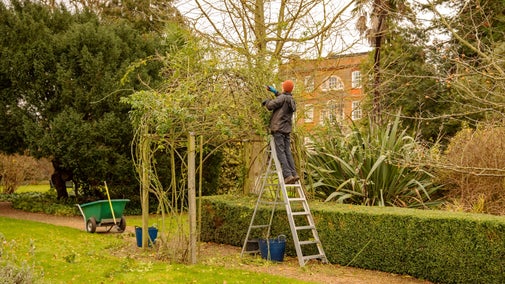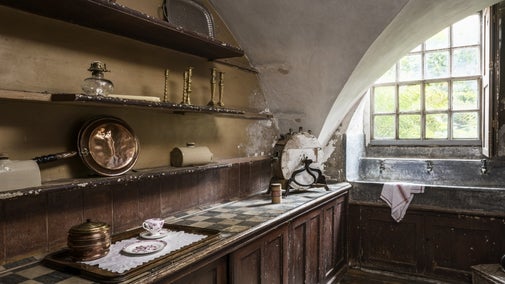The history of Peckover

Jump to
Discover the story of the Peckover family, wealthy Quakers with a love of art and travel. Their wealth derived from banking but they were known also for their philanthropy, which extended both locally and internationally. Through this benevolence, the Peckovers contributed greatly to the history of Wisbech. Their Georgian home remains testament to the prosperity of the town in the 18th century.
From small beginnings to banking heavyweight
In 1777 Jonathan Peckover moved to Wisbech and established a small grocer's business. Respected for his strong moral principles, he soon began holding his customers' money for safekeeping. What was informally known as 'Peckover's Bank' had seven accounts in its ledger in 1782, and it became the town’s first official bank, called the Wisbech and Lincolnshire Bank.
It thrived under his family's management until 1893 when direct involvement ceased. In 1896 Peckover's bank was amalgamated with 19 others into Barclays Bank which, not many people know, was originally a Quaker enterprise.
Quakerism and the Peckovers
The Quaker movement began almost 400 years ago. Quakers believe that faith is a personal matter and that everyone possesses their own Inner Light, allowing them direct communication with God.
Their rejection of the role and rituals of the clergy challenged the authority of the Church of England and led to their exclusion from university and certain professions. As a result they tended to enter the trades, most notably (like the Peckovers) banking, alongside shopkeeping and farming.
They became a tight-knit, inter-married community, with a strong moral code and deep religious beliefs which coloured all their dealings. This is most probably why the Peckovers were successful in their banking enterprises, while other provincial banks went under.

The purchase of Peckover House
From the late 18th century through the 19th century, Wisbech was a prosperous merchant town with a busy port exporting wool and grain, and importing coal and timber.
The North and South Brinks, which face each other across the River Nene, developed around mercantile activities. It was on the North Brink, to this day considered one of the finest Georgian brick streets in England, that Jonathan Peckover saw the property then known as Bank House, and later Peckover House.
This handsome residence in the foremost part of town, which Jonathan purchased in the 1790s, would provide him the necessary signs of stability upon which to build his banking career. The business was situated in a purpose-built hall to the south-west of the house until 1879 when the bank moved to spacious new premises in the Old Market, still in use today as Barclays Bank.
Incidentally, National Trust founder Octavia Hill was born in 7 South Brink, almost opposite Peckover House.
The family’s local legacy
Known for their philanthropy, the Peckovers supported various causes and campaigned for the abolition of slavery and improvements in education. Their wealth helped fund many institutions, including the Wisbech and Fenland Museum.
Successive generations of the family were prolific amateur and, in some cases, professional artists. They coupled their love of painting with travel, creating a permanent record of travels around the continent, much as we would take holiday photos today.
Alexander, Lord Peckover (1830–1919) travelled extensively. Tis collections acquired in Egypt were donated to the local museum, where they remain central to their Egyptian collections today.
His daughter, Alexandrina, was an adventurer and sportswoman who climbed the Alps at a time when most Victorian women were not expected to do anything so strenuous.

The National Trust
Alexandrina, the last descendant of Jonathan Peckover, gave the house and its 48-acre estate to the National Trust in 1948.
But it came with very few possessions and original contents, which meant having to fill the rooms with 18th-century items found at auctions and in National Trust furniture stores.
This ‘Georgianising’ campaign has more recently been superseded by a desire to make the house more representative of the Peckover family's taste. Significant loans and gifts of indigenous items from the family that Lord Peckover’s eldest daughter married into, and the redecoration of several rooms in their pre-1948 style, have gone some way to making the story of the learned, philanthropic and deeply religious Peckover family more explicit.
You might also be interested in
Peckover House
From the library and banking hall to the cabinet of curiosities, the rooms in this classic Georgian home have many stories to tell. Discover how the Peckovers lived their lives here.

The gardens at Peckover
Tucked away behind a Georgian mansion sits a beautiful Victorian garden. Reflecting the family's love of travelling, horticulture and gardening, this hidden gem is full of surprises.

Planning your visit to Peckover House & Gardens
Discover the story behind Peckover house and gardens. If you're planning a visit, you can find out everything you need to know here...

History
Learn about people from the past, discover remarkable works of art and brush up on your knowledge of architecture and gardens.
